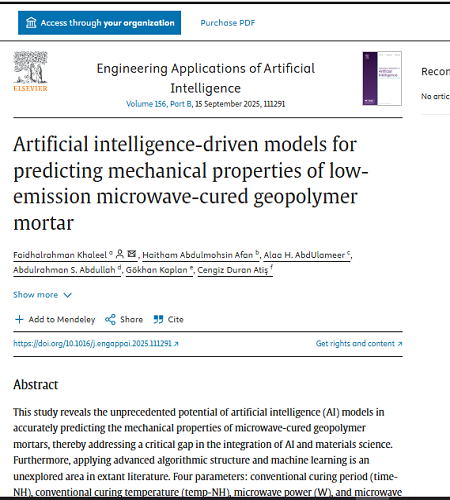| News Details |
One of Researches at University of Anbar publishes an international study on the use of artificial intelligence (AI) in sustainable building materials
2025-06-01

A researcher from the Euphrates Center for Sustainable Development Research at University of Anbar published an international scientific study on the use of artificial intelligence in sustainable building materials. The study was titled: "Artificial Intelligence Models for Predicting the Mechanical Properties of Low-Emission Microwave-Treated Geopolymer Mortar." The manuscript published in the journal Engineering Applications of Artificial Intelligence, an international journal published by Elsevier, and ranked in the top quartile with an impact factor of 7.5 and a Citescore of 9.6, this research project was led and implemented by Assistant Professor Dr. Haitham Abdul Mohsen Affen, Head of the Climatology Department at the Upper Euphrates Center for Sustainable Development Research at University of Anbar, in collaboration with researchers from:
· Ataturk University - Turkey.
· Erciyes University - Turkey.
· Maarif University - Iraq.
· Future University - Iraq.
The research focused on using artificial intelligence techniques such as deep neural networks and probabilistic models to predict the compressive and flexural resistance of green materials when processing them by microwave.
This study is directly related to the Sustainable Development Goals (SDGs).
· Goal 9: Industry and Innovation – Using artificial intelligence to develop smart building materials.
· Goal 11: Sustainable cities and communities – Supporting the use of environmentally friendly building materials.
· Goal 13: Climate action – Reducing carbon emissions and energy consumption.
· Goal 12: Responsible consumption and production – Utilizing industrial waste.
· Goal 17: Partnerships – International cooperation between Iraqi and Turkish universities.
Study results and significance of the journal:
The study results showed that the model provided the highest predictive accuracy for material properties, contributing to a reduction in the number of laboratory experiments. Toward a more sustainable future, the study recommends expanding the database, exploring hybrid models, and applying modern techniques to improve performance, with a focus on environmental efficiency and reducing waste.
- To view the full study, please follow the link below:
https://doi.org/10.1016/j.engappai.2025.111291
#Upper_Euphrates_Center_for_Sustainable_Development_Research







